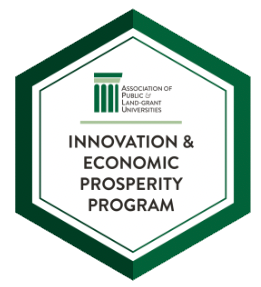ECU’s Innovation & Economic Prosperity Designation
East Carolina University has been recognized as an Innovation and Economic Prosperity University since 2015. In 2024, ECU was one of only 15 other universities to receive the Association of Public & Land-Grant Universities’ Innovation & Economic Prosperity Program 5-Year Extension.

“The IEP Program helps higher education institutions better know, measure, tell, and enhance their economic and community development impact while recognizing institutions that have demonstrated a substantive, sustainable, and institution-wide commitment to and strategy for regional economic engagement, growth, and economic opportunity.”
– Association of Public and Land-grant Universities, aplu.org
Since ECU first received the prestigious designation at the program’s inception in 2015, the university has committed to being an economic and innovation driver for eastern North Carolina. Inspired by its IEP involvement, ECU has made significant advancements over the years in supporting new knowledge, technologies, and community-embedded clinics to solve significant societal problems. ECU has also worked to strengthen partnerships with other universities and community colleges to unify more tightly around the workforce development, commercialization, manufacturing, and business sustainability needs in eastern North Carolina.
ECU serves 29 of North Carolina’s eastern most counties located between I-95 and the coast. Many of these counties are rural areas that have been identified by the NC Department of Commerce as Tier 1 and Tier 2 counties, meaning they are the most economically distressed in the state. To help bring about true regional transformation, ECU has taken steps to assess, design, and implement innovative strategies that help build more vibrant and competitive communities into pathways toward prosperity.
Through a coordinated, campus-wide approach to connecting with partners across the region, ECU faculty and students work directly with communities, nonprofit organizations, schools, business and industry leaders, military leaders, entrepreneurs, and government officials to assess local issues and offer tangible solutions through collaboration and mutually beneficial partnerships.
REDE’s Office of Economic & Community Engagement showcased numerous examples of collaborative successes between faculty, staff, students, and community partners in eastern North Carolina to prepare the application that secured the 5-year extension recognition. Examples included:







